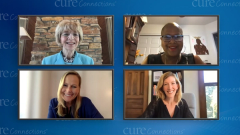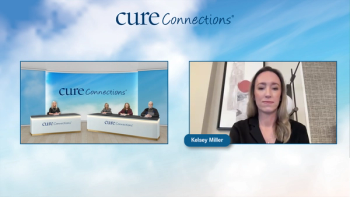
Stories of Metastatic Breast Cancer Diagnosis
Shirley Mertz, MA, JD, Lisa Laudico, and Sheila McGlown share their stories of being diagnosed with metastatic breast cancer.
Episodes in this series

These are the experiences and opinions of panelists, not physicians.
Shirley A. Mertz, MA, JD: Hello, and welcome to this Cure Connections video series. Overcoming challenges to a metastatic breast cancer diagnosis. I am Shirley Mertz from Inverness, Illinois. I serve as the president of the Metastatic Breast Cancer Network. And I'm a founding member and former chair of the Metastatic Breast Cancer Alliance. Today I am joined by an amazing group of women, who are going to share in this discussion. I'd like each of them to say a little bit about themselves. And we'll start with Julie. Welcome, Julie.
Julie Larson, LCSW: Thank you so much. It is quite an honor to be here today. I appreciate the invitation. My name is Julie Larson and I am a clinical social worker. I've spent the entirety of my career working in oncology supportive care in many ways and sitting with individuals in my office, and in groups, and in large audiences talking about the impact of a cancer diagnosis. I look forward to a big conversation with all of you ladies today.
Shirley A. Mertz, MA, JD: Thank you, Julie. We're so happy to have you. And next I'd like to introduce Lisa. Hello, Lisa.
Lisa Laudico: Hi, thank you so much. I'm happy to be here as well. I am a senior producer and host of the Our mBC life podcast from SHARE Cancer Support. And in addition, I'm a member of the Metastatic Breast Cancer Alliance and have been living with metastatic breast cancer since 2017. And I don't know if I mentioned, but I live in Westport, Connecticut.
Shirley A. Mertz, MA, JD: Thank you, Lisa Laudico, welcome. And next, not last, Sheila McGlone.
Sheila McGlown: Hi, I'm Sheila McLaughlin. I'm a 25-year air force veteran. And I'm also a 11-year metastatic breast cancer patient. My mom died of metastatic breast cancer in 2004. And five years later, I received the diagnosis. But I'm an independent advocate. And I'm glad to be here and honored to be here with these beautiful ladies. And thank you.
Shirley A. Mertz, MA, JD: And Sheila though, we're going to talk about metastatic breast cancer. I want to just say upfront, thank you for your service to our country.
Sheila McGlown: Thank you.
Shirley A. Mertz, MA, JD: That is awesome.
Sheila McGlown: Thank you.
Shirley A. Mertz, MA, JD: Today, our panel will discuss challenges that face persons who have received a diagnosis of metastatic breast cancer. These challenges could include dealing with the shock of the diagnosis, how to share it with family and friends, handling anxiety and worry, and taking care of one's body, getting the very best care, and when to consider clinical trials. Our experienced panelist have lots to say and share. Let's get started with our first topic. I think all of us who are patients when we hear the words, "You have metastatic breast cancer.", can remember exactly where we were and how we felt. Lisa, I'd like to turn to you first. How did you feel when you heard those words? And how did you handle the emotions you felt, maybe that day and sometime afterwards?
Lisa Laudico: Well, I hear this a lot when I talk to friends who also are living with metastatic breast cancer. Your kind of you're in shock. It's absolutely a shocking diagnosis. For me, I have a family history of breast cancer, many. But everyone in my family on the maternal side, all had early-stage diagnoses. And so, for our family, our family narrative around breast cancer was that it's a manageable disease, clearly. Our family has no way better educated since my diagnosis. And I was oligometastatic. I was someone who had just a few mets on my spine that crossed me over the edge from a stage III diagnosis, and all of the bad entails, to this new world of being a de novo metastatic breast cancer patient. I was in shock for sure. However, I do think that because I've had some training, and trauma in my professional life at that time. I think I utilize that training. It must've helped me because I was able to be fairly calm. And the panic I had- Calm about myself, but the panic I had was about my family. I had a child in a senior year of high school, which is a total blessing, a child in college, and a husband and extended family members. And all of them- I guess the first step would be that my husband and I received the official final diagnosis after I had some biopsies to confirm the metastatic diagnosis. And this incredible oncologist who we will never forget, spent a lot of really empathic time with us to talk about it and to give us hope. Yes, and to give us a game plan pretty quickly. So that's the initial shock that I had. But I don't know if I could have actually said the words right then in the beginning to my husband and to family members. I got metastatic breast cancer. And, no, I'm not going to have a mastectomy because it's not indicated at the moment that that makes sense. Not going to extend my life. There's no cure and so on. All those words coming out of my mouth in that moment when I find out that I have mBC, that's a hard lift. I got better over time, but initially, I really was grateful for that very empathetic oncologist who really took the time with us to unpack it all for us. And not everyone's so fortunate, but I got a really good one. And so that was I guess the first step.
Shirley A. Mertz, MA, JD: That's great to hear, your experience. Sheila, would you like to add anything about your experience in terms of when you first were told.
Sheila McGlown: Well, I was active-duty military, and I felt the sneeze and that's how I found out, basically. I had IV breast cancer. I didn't know metastatic met IV, because like I said, my mom had died five years ago. But in the black community, we don't talk about being sick. And I never- I don't know. I was just like; was I blind during that time? Should I have found out more information? And then I was diagnosed at 43. And I'm like, I didn't know any black women that were 43 that had breast cancer. Because you look at the commercials and I was older white women that. Well, I'm 43, how can I- And it was just a shock. I was just like, I have breast cancer. And then when he showed it to me, he actually showed it to me on the radiology screen. And he said, "You see all that white stuff in your breasts?". He said, "That's breast cancer." And after they did all the CT scans and everything, he said, "What you were feeling was, every time you sneeze, the cancer has spread to your ribs. And every time you sneeze, the cancer had what's pressing up on your ribs." I was in a shock. I didn't know what to do. It was just- And then my daughter was in college. I didn't know how to tell her. I didn't know how to tell my father, whose wife died of metastatic breast cancer. It was a lot I had to learn first and educate myself first for- I couldn't even tell anyone. So yeah, I was in shock. I was just like, and what do I do with this?
Shirley A. Mertz, MA, JD: What we've heard from Lisa and Sheila are two examples of de novo metastatic breast cancer, which means is I think Lisa pointed out that was her first diagnosis as is true of Sheila. I might just at this point share that I'm an example of someone who had early-stage breast cancer. Mine was in 1991 and I chose at that time to get a double mastectomy, even though the breast cancer was only in one breast. Two little boys, I want to raise them, blah, blah, blah. And I thought, well, I beat this. In fact, the doctor who did my mastectomy said, "You're done, you're cured. Go on with the rest of your life." Yay. And then 12 years later, my breast cancer came back into my spine. We're somewhat sisters, Lisa. And then I am what is called a recurrent metastatic breast cancer person. And ultimately, it did spread throughout my bones. And I've had to deal with it since. There are different types of metastatic breast cancer.
This transcript has been edited for clarity.




